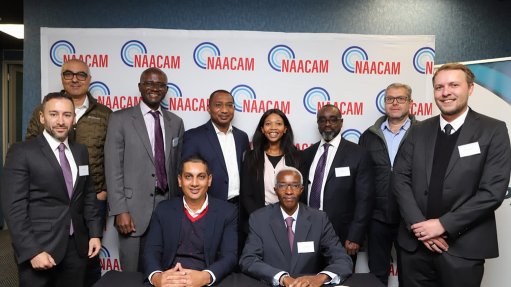
Naacam CEO Renai Moothilal (bottom left) and IFC regional director Kevin Njiraini (bottom right) alongside more partners of the matchmaking platform
The International Finance Corporation (IFC) has partnered with the National Association of Automotive Component and Allied Manufacturers (Naacam) to develop an automotive “matchmaking” platform, matching the procurement needs of original-equipment manufacturers (OEMs) and tier-one suppliers to the capabilities of tier-two and -three local suppliers.
The IFC will support Naacam in developing this platform, which will be informed by inventories and databases of components that may be manufactured locally.
In turn, sub-tier suppliers can gain access to valuable information on local supplier development opportunities and can cultivate bankable projects to help unlock private investment for more local production.
The agreement between the IFC and Naacam speaks to the South African Automotive Masterplan, which aims to increase the market share of local component manufacturers in the automotive sector in the country to at least 60% by 2035.
The platform will also help OEMs and tier-one suppliers meet localisation targets.
Naacam president Ugo Frigerio explains that, while there have been policy advancements towards a higher localisation rate, a practical barrier to unlocking this remains inefficient flows of information between buyers and suppliers in the value chain.
Often, he adds, emerging suppliers and new entrants are unable to identify localisation opportunities in their area of engineering capability.
Simultaneously, it is not easy for OEMs and tier-one suppliers to collate up-to-date information on new and existing suppliers in terms of capabilities and accreditations.
Naacam executive director Renai Moothilal adds that the association’s members are heeding the call to deepen localisation, which not only delivers much-needed employment and other economic benefits, but also reduces suppliers’ risks as they become less reliant on imported components.
He says the automotive industry has become too used to import penetration in the market, and this needs to change if the sector is to create more jobs and meet national targets.
Naacam commercial director Shivani Singh points out that the platform will minimise the friction of “back and forth” that tier-one suppliers or OEMs often experience in trying to find suitable suppliers.
Moreover, the partnership will enable South African local components manufacturers to access peer learning opportunities with frontier countries to support capacity development. The platform could also help OEMs and tier-one suppliers identify potential suppliers at sub-tier level.
IFC country manager for South Africa Adamou Labara comments that the IFC – which is part of the World Bank Group – is pleased to partner with Naacam to develop a platform that will lead to more business opportunities for local component suppliers, and facilitate the transfer of technology, competencies and skills from global manufacturers to local suppliers.
The IFC adds that, with its backing, and taking the most risk with the partnership, it opens up opportunities for more financiers to come on board.